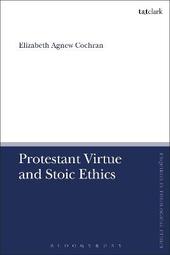
|
Protestant Virtue and Stoic Ethics
Paperback / softback
Main Details
Description
The Stoics are known to have been a decisive influence on early Christian moral thought, but the import of this influence for contemporary Christian ethics has been underexplored. Elizabeth Agnew Cochran argues that attention to the Stoics enriches a Christian understanding of the virtues, illuminating precisely how historical Protestant theology gives rise to a distinctive virtue ethic. Through examining the dialogue between Roman Stoic ethics and the work of Martin Luther, John Calvin, and Jonathan Edwards, Cochran illuminates key theological convictions that provide a foundation for a contemporary Protestant virtue ethic, consistent with theological beliefs characteristic of the historical Reformed tradition.
Author Biography
Elizabeth Agnew Cochran is Associate Professor in the Department of Theology at Duquesne University, USA.
ReviewsSufficiently insightful and creative to benefit students of moral theology and religious ethics, as well as scholars of virtue ethics searching for new points of entry into debates on, for example, the unity of the virtues and the role of faith in moral progress. * Studies in Christian Ethics * In the ever-growing literature on the recovery of virtue ethics, classical Protestant sources have been under-represented. The present volume is therefore a welcome addition to the contemporary study of virtue... This is a stimulating work. Cochran does the field of moral theology a service not only by extending discussions of virtue ethics to Luther, Calvin, and Edwards but also by calling attention to the Stoic tradition and its (often indirect) influence on Christian thought. * Modern Theology * Elizabeth Agnew Cochran articulates a basis for a distinctively Protestant ethic of virtue by reading the theological ethics of Luther, Calvin, and Edwards in light of Stoic thought. A discerning and welcome contribution to the ethics of virtue. * Diana Fritz Cates, University of Iowa, USA * As he walked to the guillotine in Edinburgh in May 1661, Archibald Campbell, Marquess of Argyll, with whose fate Presbyterianism was intertwined, calmly remarked, 'I die not as a Roman braving death but as a Christian without being affrighted'. Elitist, cognitive and austere, this striking avowal illustrates an unexpected and deep interplay between Protestant moral character and aspects of Roman stoicism, not least in their broad belief in providence and account of human emotional life. This is an original, valuable and illuminating account. * Iain Torrance, President Emeritus of Princeton Theological Seminary, USA * Protestant Virtue and Stoic Ethics is an important book. The turn to virtue in modern ethics typically has invoked a retrieval of Aristotle and Aquinas, even among thinkers associated with radical Protestantism. Without flatly denying these resources, Cochran deftly challenges the distorting narrative that often accompanies them by creatively pairing an alternative account of Stoic ethics and historical Protestant theology as expressed in figures like Luther, Calvin, and Edwards. Learned and constructive, the result is one of the most generative interventions in recent Protestant moral theology. In fact, by attending to diverse and often neglected conceptions of faith and moral agency, she provides a valuable contribution to virtue ethics, the reception history of moral traditions, and religious ethics more broadly. * Eric Gregory, Princeton University, USA * A consistent and easily readable analysis of the interplay between stoicism and Reformation theology. * Theologische Literaturzeitung (trans. by Bloomsbury) *
|